|
|
|
Sort Order |
|
|
|
Items / Page
|
|
|
|
|
|
|
| Srl | Item |
| 1 |
ID:
134068
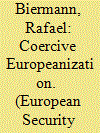

|
|
|
|
|
| Publication |
2014.
|
| Summary/Abstract |
Secessionism is still the predominant conflict type in Europe. Even though the European Union (EU) extended the enlargement perspective to the Balkans 15 years ago, secessionist ambition remains pervasive, especially in Bosnia, Kosovo, Macedonia and Serbia. How does secessionism affect Europeanization and how does Europeanization affect secessionism? It is argued here that in cases of unattained statehood domestic power struggles among deeply divided elites over status and territorial control undermine the consensus needed for Europeanization. In cases of attained de facto statehood the conflict focuses on recognition, which likewise polarizes societies and marginalizes reform. In such high-resistance scenarios, where the inclusionary EU norms clash with the exclusionary norms of the secessionists, the EU vigorously works to marginalize the secessionists by relying mainly on denial, punishment and imposition. Still, the EU's leverage is often insufficient in moving the conflicting parties towards within-state solutions and reform. A study of Bosnia's transformation since Dayton reveals, however, that the EU's leverage varies over time and that the EU at times itself inadvertently fans secessionism.
|
|
|
|
|
|
|
|
|
|
|
|
|
|
|
|
| 2 |
ID:
171945


|
|
|
|
|
| Summary/Abstract |
With high interdependence, politicization, and unlikely enlargement, alternative options for EU–Turkey relations beg for consideration. This article argues that, first of all, conceptualization of a new model of EU–Turkey relations must thoroughly account for the evolution of the European project away from uniformity and towards more differentiation as a result of both integration and disintegration pressures. Secondly, an extended model of external differentiated integration has a potential to foster new, more dynamic EU–Turkey relations. However, its practical implementation is constrained by a number of challenges and scope conditions related to preferences and interests of key actors, namely EU institutions, member states and Turkey.
|
|
|
|
|
|
|
|
|
|
|
|
|
|
|
|
| 3 |
ID:
099310


|
|
|
|
|
| Publication |
2010.
|
| Summary/Abstract |
The purpose of this paper is to analyze the economic and environmental implications of Turkey's possible accession to the European Union (EU). The paper focuses on the impacts of three main components of Turkey's possible EU membership: (i) the free movement of labor between the EU and Turkey, (ii) the free movement of capital, and (iii) the burden-sharing of Turkey in terms of the EU's environmental objectives in the horizon of 2020, that is, the reduction of carbon emissions. Among these, a particular focus is placed on the influence of the CO2 emission reduction targets in both regions and their consequences on the carbon price in 2020. We estimate the resource allocation effects of EU climate change policies on both regions by taking into account the likely labor movement from Turkey to the EU and capital movement in the reverse direction. The results show that different emission targets for the two regions bring about a change in comparative advantages and thus a change in interregional competitiveness.
|
|
|
|
|
|
|
|
|
|
|
|
|
|
|
|
| 4 |
ID:
077417


|
|
|
|
|
| Publication |
2007.
|
| Summary/Abstract |
International Relations benefits from historical comparative research. Although a historical comparative method can be fruitfully applied to the study of the European Union (EU), it is rarely undertaken. In this article, EU accession politics, particularly its 2004 enlargement, is compared with 19th century `standards of civilization' developed by European states concluding treaties with non-European nations. This article argues that EU accession politics operates in the legacies of 19th-century imperial rule. Understanding the EU in terms of an (new) empire might enrich the discussion of the perception and categorization of the EU as an international order.
|
|
|
|
|
|
|
|
|
|
|
|
|
|
|
|
| 5 |
ID:
077415


|
|
|
|
|
| Summary/Abstract |
International Relations benefits from historical comparative research. Although a historical comparative method can be fruitfully applied to the study of the European Union (EU), it is rarely undertaken. In this article, EU accession politics, particularly its 2004 enlargement, is compared with 19th century `standards of civilization' developed by European states concluding treaties with non-European nations. This article argues that EU accession politics operates in the legacies of 19th-century imperial rule. Understanding the EU in terms of an (new) empire might enrich the discussion of the perception and categorization of the EU as an international order.
|
|
|
|
|
|
|
|
|
|
|
|
|
|
|
|
| 6 |
ID:
190818
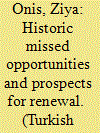

|
|
|
|
|
| Summary/Abstract |
Turkish-European Union (EU) relations in the broader context of the transatlantic alliance have been one of the defining features of Turkish foreign policy in the post-war era. The article identifies elements of the cyclical nature of the relationship and missed opportunities, notably in the 1970s and the early 2000s, which have been costly both to Turkey and the EU. Domestic politics and crises both in Turkey and the EU have played an important role in shaping the long-term dynamics of this complex and mutually important relationship. The emerging post-Western order has contributed to the decline and recent stalemate in Turkey-EU relations. The article probes into the possibilities of a revival in Turkey-EU relations and consider whether the Russian war against Ukraine will create a new opportunity for a revival of the relationship as part of a new wave of enlargement, which was not on the agenda previously.
|
|
|
|
|
|
|
|
|
|
|
|
|
|
|
|
| 7 |
ID:
169218
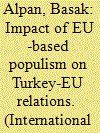

|
|
|
|
|
| Summary/Abstract |
The May 2019 EP elections once again highlighted the current cultural backlash throughout Europe against progressive values such as cosmopolitanism and multiculturalism, which impacts on the ‘future of Europe’ debate, raising important questions for the evolution of Turkey-EU relations. Even though Turkey is no longer a hot topic in EU political parlance and public opinion, opposition to Turkish EU membership continues in the form of nativism, particularly with reference to the issues of immigration and Islam, as the cases of AfD in Germany and UKIP in Britain show.
|
|
|
|
|
|
|
|
|
|
|
|
|
|
|
|
| 8 |
ID:
077398


|
|
|
|
|
| Publication |
2007.
|
| Summary/Abstract |
On 1 May 2004 the European Union's biggest Enlargement ever materialised when ten countries joined the EU. The new member states-Cyprus, the Czech Republic, Estonia, Hungary, Latvia, Lithuania, Malta, Poland, the Slovak Republic, and Slovenia-brought 75 million new citizens into the Union which now comprises a population of 455 million. In spite of the historical importance of EU enlargement, it seems to have raised relatively little interest beyond Europe. This paper tries to narrow the research gap by discussing the most significant implications of EU enlargement for Europe-Asia relations in the areas of general inter-regional (political) links, trade and investment
|
|
|
|
|
|
|
|
|
|
|
|
|
|
|
|
| 9 |
ID:
180563
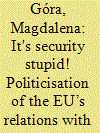

|
|
|
|
|
| Summary/Abstract |
The European Union’s security depends on how stable and peaceful its neighbours are, and yet the security situation around it has been deteriorating in recent years. The EU policies designed to stabilise the neighbourhood – the European Neighbourhood Policy (ENP) and EU enlargement – were originally designed as “low politics” of foreign policy focusing on economic instruments and tools of democratisation, but in time security became a prime concern. The article firstly shows how the European Parliament and national parliaments narrate these challenges in the neighbourhood and how security-related concerns become central to the ENP and enlargement. Secondly, in capturing the security concerns, it also shows how such changes contribute to the politicisation of relations with neighbours and how these processes differ between national and supranational level. Empirically, the politicisation of the ENP and EU enlargement in national parliaments (the UK, Poland and Ireland) and the European Parliament between 2004 and 2014 is compared and analysed.
|
|
|
|
|
|
|
|
|
|
|
|
|
|
|
|
| 10 |
ID:
159779
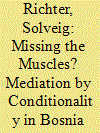

|
|
|
|
|
| Summary/Abstract |
In October 2009, the European Union, in conjunction with the United States, launched a high-level mediation effort in Butmir, Bosnia and Herzegovina, to reform the political structure of the state. Since 2005, the constitution which was included in the Dayton Peace Accord has been widely perceived as dysfunctional. In two negotiation rounds, the EU and the US put a comprehensive proposal on the table and showed strong leverage. However, the talks ended without a tangible result. To explain this failure, a theoretical model is developed based on both mediation and Europeanization literature to explore mediation by conditionality as a type of ‘directive mediation’ in a systematic way. Contrary to the argument that the EU lacked muscle, it is argued that pre-conditions for political conditionality were not fulfilled and strong leverage proved ineffective and counterproductive. These results question conditionality as an effective mediation strategy when state-building is contested between local parties.
|
|
|
|
|
|
|
|
|
|
|
|
|
|
|
|
| 11 |
ID:
140886


|
|
|
|
|
| Summary/Abstract |
Recent geopolitical changes and the strengthening of the security/economy nexus have multiplied the types and functions of territorial borders in the Baltic Sea Region (BSR). These borders have been insufficiently addressed in previous research even though macro-regions cross over multiple borders, which are highly affected by geopolitical events and conflicts. This paper contributes to the debate about multiple borders with particular emphasis on the question how de- and re-bordering affect the regionalisation process in practice and how it influences the cooperation within the BSR. The results, which are based on a discourse analysis of a corpus of documents, show that the region-building process in the BSR itself creates new borders, which define the level of the member state’s political participation in the region. The governance of macro-regions would benefit from the development of such analytical frameworks that take into account the impact of the multitude of borders on the practical level.
|
|
|
|
|
|
|
|
|
|
|
|
|
|
|
|
| 12 |
ID:
077416


|
|
|
|
|
| Summary/Abstract |
International Relations benefits from historical comparative research. Although a historical comparative method can be fruitfully applied to the study of the European Union (EU), it is rarely undertaken. In this article, EU accession politics, particularly its 2004 enlargement, is compared with 19th century `standards of civilization' developed by European states concluding treaties with non-European nations. This article argues that EU accession politics operates in the legacies of 19th-century imperial rule. Understanding the EU in terms of an (new) empire might enrich the discussion of the perception and categorization of the EU as an international order.
|
|
|
|
|
|
|
|
|
|
|
|
|
|
|
|
| 13 |
ID:
162508
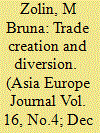

|
|
|
|
|
| Summary/Abstract |
Based on estimation of the gravity equation, this article aims to scrutinise the trade effects emanating from the economic integration of the European Union (EU) by focusing on the trade diversion and trade creation effects of the fifth EU enlargement on 12 groups of agricultural and food products. This paper analyses the changes due to the EU’s enlargement of trade patterns in the agricultural and food sectors among the EU member states and between EU and non-EU countries as well as the effects of the enlargement on exports of agricultural and food products from selected Asian countries to the EU market. Our analysis shows no decline in exports from EU to non-EU countries. Trade creation effects are significantly high for 4 product groups: seafood, woody plants, beverages and tobacco, and animal and vegetable materials. However, trade diversion effects are found in animal and vegetable oils and textile fibres. Moreover, the economic integration has had no significant effect on exports from Asian countries, namely agricultural and food products. The data of 38 countries cover the period 1999–2015.
|
|
|
|
|
|
|
|
|
|
|
|
|
|
|
|
|
|
|
|
|